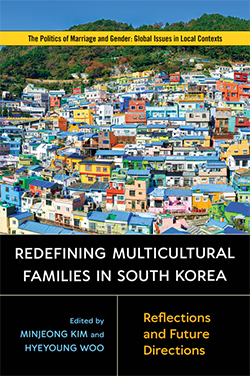
Minjeong Kim

Professor & Director of Center for Asian & Pacific Studies
Office: NH-215
Email: [email protected]

Minjeong Kim is a professor of Sociology at SDSU. Originally from South Korea, Minjeong
Kim studied women’s studies (M.A.) and sociology (Ph.D.) at the University at Albany,
State University of New York. Her research areas include gender and sexuality, race
and ethnicity, family and international migration, and popular culture. Kim has published
numerous peer-reviewed articles and book chapters on these topics. Kim is the author
of Elusive Belonging: Marriage Immigrants and “Multiculturalism” in Rural South Korea (2018, University of Hawai’i Press) and co-editor of Global Gender Research: Transnational Perspectives (2009, Routledge) and Redefining Multicultural Families in South Korea: Reflections and Future Directions (2022, Rutgers University Press). Kim is currently working on a book manuscript based
on her research about Korean immigrant communities on the US-Mexico border.
Research Projects
The Emergence of Korean Immigrant Communities on the U.S.-Mexico Border
The international expansion of multi-national corporations and the bi-national economic operation on the U.S.-Mexico border has facilitated the growth of immigrants who are from neither border countries but have transborder lives. This ethnographic project investigates the conditions of migration, settlement, and incorporation of immigrants who moved to a bi-national border region from a third country. The case study of Korean immigrant border communities will evaluate how ethnic immigrants, who are engaged in inter-ethnic social and economic interactions within both countries, are integrated into them, and how co-ethnic ties, ethnic identity, and political context affect their integration process. (NSF #1823828)
Based on this project, Kim recently published "Cross-Border Anxiety among Korean Border Commuters at the US-Mexico Border" (Journal of Borderlands Studies, 2025).
 Multicultural Families in South Korea
Multicultural Families in South Korea
Kim has been working on the issues related to so-called multicultural families—marriage immigrants and their children—in South Korea for over two decades. Based on ethnographic research of Filipina marriage immigrants in South Korea rural communities, Kim published several articles and a book, Elusive Belonging: Marriage Immigrants and Multiculturalism in Rural South Korea (2018).
With the support from the Academy of Korean Studies, Kim co-edited a volume with Professor
Hyeyoung Woo (Portland State University), titled Redefining Multicultural Families in South Korea: Reflections and Future Directions. Also, with Distinguished Professor Pei-Chia Lan (National Taiwan University), Kim
co-edited a special issue on "The Emerging Second Generation in Asia" in Ethnic and Racial Studies.
Gender and Race in the Media
Kim studies media representations with a focus on gender, sexuality and race. Her publications include “Consuming Orientalism: Images of Asian/American Women in Multicultural Advertising” (Qualitative Sociology, 2005), “The Deployment of Gender for Masculine Balance: Analyzing Multi-Platform K-pop Performances” (with April Lopez, Feminist Media Studies, 2023), and “No Face, No Race? Racial Politics of Voice Actor Casting in Popular Animated Films” (with Rachelle Brunn-Bevel, Sociological Forum, 2023)."